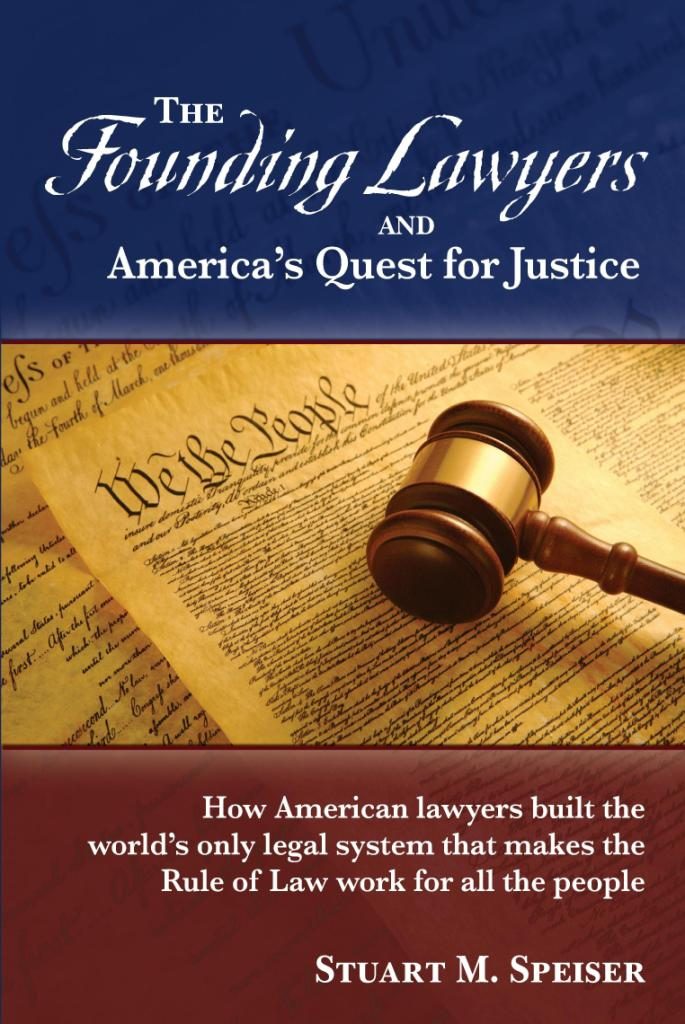
In 2010, the Institute published The Founding Lawyers and America’s Quest for Justice, the last written work of the late Stuart M. Speiser. Speiser was a veteran trial lawyer (founder of the AAJ Aviation Law Section) and a prolific author, with more than 50 volumes on legal and economic subjects to his credit.
The Founding Lawyers is the first book to explore the significance of the dominating role that was played by a few dozen lawyer-statesmen in creating America’s constitutional democracy and making it work. In it, Speiser shows how they used their legal skills to conceive, initiate, and execute a revolutionary plan for an entirely new form of government. They called it a Government of Laws, and enshrined it in the United States Constitution, which could not have been adopted without their many deft and daring legal maneuvers dating back to the Declaration of Independence.
Speiser also explains how the legal system which was nurtured by the Government of Laws has evolved into today’s American Rule of Law — the only legal system in the world which provides access to justice to all citizens. He shows how other countries — even the western democracies — have denied that access to most of their citizens through obstacles such as the Loser Pays rule, excessive filing fees, and prohibitions on contingent legal fees. He explains why cases like Brown v. Board of Education, Ralph Nader v. General Motors, and other ground-breaking private litigation could not have been broughtto court in any other nation.
In addition to being a fascinating, lively read, The Founding Lawyers also makes an excellent gift for all lawyers, judges, legislators, law school and college teachers, and history buffs.
Praise for The Founding Lawyers
At a time when they were still leeching sick people, lawyers were writing the U. S. Constitution and other founding documents. The Founding Lawyers and America’s Quest for Justice is a must-read for everyone in the legal community. It’ll make you proud to be a lawyer. I’ll never refer to “The Founding Fathers” again!
William Hale Singletary, Chancellor, 5th Chancery Court District, State of Mississippi
Stuart Speiser is the leading exemplar of a tradition of astute scholarly commentary by seasoned practitioners. In this lively and provocative historical reflection, he makes a significant contribution to our understanding of the singular role of lawyers and litigation in American governance. His appreciation of the creative currents in American law is coupled with critical scrutiny of popular legal myths.
Marc Galanter, John & Rylla Bosshard Professor Emeritus of Law and South Asian Studies, University of Wisconsin-Madison, and LSE Centennial Professor, Department of Law, London School of Economics and Political Science.
I highly recommend the superb new book by Stuart M. Speiser, The Founding Lawyers and America’s Quest for Justice. I urge ethicists in particular to read his chapter, “The Myth of the Purifying Lawyer-Statesman,” in which Speiser demolishes the myth of a “lost lawyer” and of a “Golden Age” in which American lawyers were statesmen whose overriding concern was the public interest.
Monroe Freedman, Professor of Law and former Dean, Hofstra Law School
The Founding Lawyers . . . should be required reading for every elected official in America, to remind them of the unique role that civil cases play in preserving the balance of power under the Constitution.
Congressman Bruce Braley (D-Iowa)
At a time when the system as we know it is under attack in so many different ways, [The Founding Lawyers] comes as a really provocative reality check.
Georgene M. Vairo, Professor of Law and William M. Rains Fellow, Loyola Law School, Los Angeles, writing in Trial magazine, July 2011
Speiser’s astute analysis as an informed outsider of the challenges faced by the English legal system, combined with his unusual lawyer-centric overview of American history, makes for an engaging and thought-provoking read.
Alexander Mahdavi, writing in Solicitors Journal
About the Author
Stuart M. Speiser, 1923-2010
Stuart M. Speiser was the author of 56 volumes on law and economics. His legal works, several of them in their fourth editions, have been cited hundreds of times by the U.S. Supreme Court and other federal and state appellate courts throughout the country. A World War II bomber pilot and later a commercial pilot, he helped to pioneer the plaintiff’s side of air crash litigation, successfully representing victims of most of the major air disasters of the 20th Century, including claimants from dozens of foreign countries. He was the organizer of the Aviation Law Section of the American Association for Justice (the first such section in any bar association) and served as chairman for its first ten years (1955-1964). He pioneered the use of economists as expert witnesses to appraise loss of earning power, and authored the definitive text on the subject.
Speiser represented plaintiffs in many famous cases, including Ralph Nader’s suit against General Motors, the war among members of the Gucci family, the Entebbe hijacking, the death of Roberto Clemente, the Pan Am Lockerbie bombing, and the suit against the estate of Aristotle Onassis which revealed Onassis’s complicity in his son’s fatal airplane crash. He was involved in four of the nine cases which formed the basis for adoption of strict liability for injuries caused by defective products in the 1964 revision of the American Law Institute’s Restatement of Torts. He testified on legal matters before Congressional committees and England’s Law Commission, and has been called as the court’s expert witness by federal judges.
For his work in spreading American legal principles to other nations, Speiser was honored by the creation of the Stuart Speiser Chair at England’s Nottingham Law School. He was a member of the Honorary Board of Editors of the Journal of Post Keynesian Economics, and was awarded the James Smithson medal by the Smithsonian Institution for his art contributions to the National Air and Space Museum.